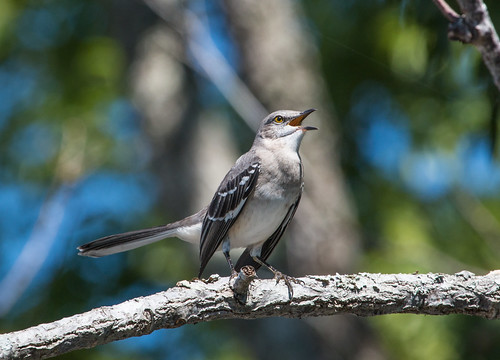When Russ and I lived in Madison, Wisconsin, our apartment was in a densely populated, very urbanized neighborhood on busy University Avenue, across from a car wash and the Erickson gas station. Yet late every February and into March and April, I’d hear, right from our yard, the songs of Eastern Wood-Pewees and Eastern Meadowlarks, not only in inappropriate habitat for both species, but also much earlier in spring than either species ever returned. I figured out the very first spring that we lived there that these songs weren’t being given by either pewees or meadowlarks—even though the songs were spot-on, they were produced by European Starlings.
Starlings, here in America only since 1890, have been a regular part of the landscape in Europe throughout written history. Their scientific name, given to them by Linnaeus himself in 1758, is Sturnus vulgaris. Sturnus is simply the Latin name for starlings. Vulgaris means common, not in the sense of being vulgar, as cynical American birders would have it, but simply in the sense of being everyday birds found throughout much of Linnaeus’s landscape.
The same year that Linnaeus named the starling, he also gave the Northern Mockingbird its scientific name, Mimus polyglottos, which means mimic of many voices.
One of my dear friends, David Gierlach, told me that he heard what he thought was a mockingbird “one starry morning - a mockingbird with a rough, whiskey-and-cigarettes coarseness to its voice.” But David found out from an acquaintance that his bird was a starling! Like mockingbirds, starlings can make perfect imitations of other bird songs, natural sounds, and mechanical and human-generated sounds.
I learned soon after becoming a birder that starlings were introduced here because of being mentioned by Shakespeare. I’d taken several Shakespeare courses in high school and college, but didn’t see a references to starlings in those. My new correspondent, Timothy Flannery, has a more classical education than I, being a retired Latin teacher from the Packer Collegiate Institute. As such, he’s probably actually read Henry IV, Part 1.
Timothy sent me additional details about his Mortimer the Starling’s imitations:
Unlike your Mortimer (or Morticia?), our starling hadn't -- yet, anyway -- begun to mimic any household appliances. I actually worried about that, as we have one doozey of a series of microwave beeps that I'm not sure I'd have relished echoed ad nauseam. Motivated by similar dread, I used to lunge for the television's mute button whenever obnoxiously repetitive commercials would come on.
That said, we had the feeling that Mortimer was just warming up to his vocalizations at the point we lost him. Besides his few articulated words, he would sometimes let forth a litany of chattering, a sort of ongoing monologue, of gutturally muttered, not-quite-articulated words but with human-sounding speech intonations, as though he were practicing innumerable phrases that would likely have emerged intelligible subsequently. He would typically hold forth thus from my shoulder during the nightly dishes, his usual hour for telling me every last detail about how his day had gone.
Mortimer did have a lovely, if sadly foreshortened, life. He was thoroughly pampered without becoming spoiled. And we spent so much quality time together, from morning to night -- just the way that incredibly gregarious creature wanted to spend his days.
There were few finer feelings I've experienced in a lifetime than being out in the yard, spotting Mortimer in the uppermost branches of our oak tree, giving him a whistle, and watching this veritable spotted angel come helicoptering down through the skies, landing, by his little heart's choice, precisely upon my own lucky shoulder. Gardening this year, and every other outdoor activity, and indoor as well, for that matter, will be a consequently lonely affair in his absence.
While Timothy was dealing with the loss when his Mortimer died, his thoughts ran to poetry. He quoted the last two stanzas of William Cullen Bryant’s 1818 poem, “To a Waterfowl”:
Thou'rt gone! the abyss of heaven
Hath swallowed up thy form; yet on my heart
Deeply hath sunk the lesson thou hast given,
And shall not soon depart.
He who, from zone to zone,That puts Timothy in the same category as Mozart, who cherished his own dear pet starling for three years. Mozart was especially charmed that his bird mimicked some of his musical phrases, even transcribing one example of the bird’s song in musical notation. Mozart was distraught when that beloved bird died in 1787, but he couldn’t be comforted by Bryant’s poem—Bryant hadn’t even been born yet. So Mozart wrote his own poem for his beloved bird’s funeral. It was written in German, but here is the English translation:
Guides through the boundless sky thy certain flight,
In the long way that I must tread alone
Will lead my steps aright.
Here rests a bird called Starling,
A foolish little Darling.
He was still in his prime
When he ran out of time,
And my sweet little friend
Came to a bitter end,
Creating a terrible smart
Deep in my heart.
Gentle Reader! Shed a tear,
For he was dear,
Sometimes a bit too jolly
And, at times, quite folly,
But nevermore
A bore.
I bet he is now up on high
Praising my friendship to the sky,
Which I render
Without tender;
For when he took his sudden leave,
Which brought to me such grief,
He was not thinking of the man
Who writes and rhymes as no one can.







